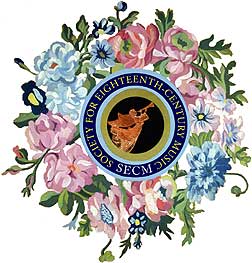Academic Mentoring and Peer Support Program
Program Overview
The SECM Academic Mentoring and Peer Support Program provides assistance to student/early career members of the society as they pursue professional development activities, engage in scholarly exchange, and build a peer network in the field of eighteenth-century music studies. Mentoring and peer support activities vary but can include one-on-one or small group conversations around a topic of shared interest, such as professional development (e.g., conference proposals, grant applications), scholarly resources (e.g., bibliography, archives), and careers in academia (e.g., job documents, interview prep). Through these activities, the program seeks to cultivate stronger ties among its members, as well as to encourage success among new generations of eighteenth-century music scholars.
Mentors
Interest form: Become a mentor!
Mentors should be active, established professionals from inside or outside the academy (e.g., professors, independent scholars, directors of research institutes, etc.) and possess a PhD or equivalent terminal degree with a specialization in any aspect of eighteenth-century music studies. Mentors are encouraged, but not required, to be current members of SECM.
Mentees
Any student currently enrolled in an undergraduate or graduate degree program, as well as early career scholars who have received a PhD (or equivalent terminal degree) in the past three years and do not currently hold a full-time position at a university or similar institution, are eligible to apply for this program. All mentees must be current members of SECM.
How to participate
If you are interested to participate in this program as a mentor or a mentee, please submit an interest form. The Student Engagement Committee of SECM will match mentors to mentees based on responses to the submitted forms and communicate matches. The mentoring relationship is meant to last approximately one year with the mentor leading communication. It is recommended that mentors and mentees arrange to meet two times over the course of the year, though each pair can decide to meet additional times. Mentors and mentees may be invited to participate in other optional sessions aimed at topics of broad interest, as well.
Timeline
- October 15, 2024 - Deadline for potential mentors and mentees to submit interest form
- November 5, 2024 - Mentor/mentee pairs notified; program begins
- August 31, 2025 - Program ends
Disclaimer: Mentoring is an important part of academic growth, and SECM values the willingness of its members to serve as mentors. Those who choose to serve as mentors should be aware that the advice that they give is solely their own and does not represent SECM. Mentors should limit their mentoring activities to those recommended by the society and should not engage in other types of mentorship (e.g., reading or providing formal feedback on dissertation chapters). Where possible, mentors and mentees will be from different institutions. Thus, mentors should exercise caution in giving advice that may create conflicts of interest or other problems, and should always recommend to mentees to seek additional advice, particularly on institutional and career-related issues, from the appropriate colleagues at their institutions.
The SECM Student Engagement Committee wishes to thank the Renaissance Society of America and Society for Music Theory whose mentoring programs provided important models.
